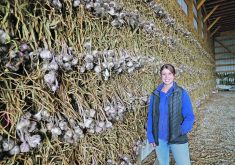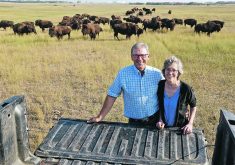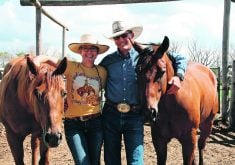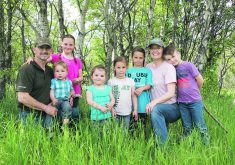RESOURCE, Sask. — For Mark and Susan Hodgson, it’s the little farm that grew.
Their quarter section farm in northeastern Saskatchewan came with a small market garden when they bought it almost a decade ago.
The farm has since grown to include more fruit and vegetables, meat processing and agritourism.
“You follow your passion and it’s where you end up,” said Mark.
Added Susan: “It just kind of happened.”
Susan, who trained as both a travel agent and licensed practical nurse, today works as a special care aide at a long-term care facility.
Read Also

Know what costs are involved in keeping crops in the bin
When you’re looking at full bins and rising calf prices, the human reflex is to hold on and hope for more. That’s not a plan. It’s a bet. Storage has a price tag.
Mark worked as a welder and farm labourer and in the oil patch and chuck wagon circuit before turning to farming full time.
“I never knew what I wanted to be, but I wanted to work for myself,” said Mark.
Their operation follows a business plan that includes strawberries, raspberries and a wide range of vegetables. They installed an abattoir and meat processing plant for wild game and domestic animals on the farm last year and also offer bonfires to groups and sleigh rides pulled by their four Clydesdale horses.
“It all ties in together,” said Susan.
When one business winds up for the season, another one begins, she added.
The meat plant provides steady business for Mark in winter, as will the Christmas trees when they are ready for market in five years. Hunting was part of the lifestyle when Mark grew up near Melfort, Sask., so processing meat was familiar territory.
A limited number of abattoirs means a steady business, Mark said.
The family rents out 120 acres of cropland, keeping the remainder for pasture for their animals and market gardens.
Their gardens are not organic but are grown without chemicals.
“We stay away from anything that requires chemicals,” said Susan, who once worked for a British Columbia market gardener and grew up on a farm near Makwa, Sask.
Added Mark: “We’re not organic but we practise pest-free management.”
Susan said it means a lot of hand weeding, but the reward is control over the food they produce.
“We want good food for the kids,” she said.
The farm benefits from soil that holds moisture well and uses drip irrigation systems. High tunnels help control their growing environment, increase temperatures and extend the season into November.
The Hodgsons replace their strawberry crowns annually to avoid cutting runners. This year they will plant 40,000 new ones.
Change is their only constant. Mark originally built the meat shop as a welding shed but changed gears when the recession hit and jobs dried up.
They receive help in the operation from their children, Katrina, 14, Brayden, 11, and Tyson, 7, and Mark’s parents, Larry and Sandi. This year, the family also plans to hire 10 casual workers as they increase production to supply Co-op stores.
Katrina helps in the gardens while Brayden prefers building or “anything that doesn’t involve gardening,” he said.
The Hodgsons promote their goods through Facebook and signs on the highway, selling most of their goods by word of mouth, at a farmers market and through a U-pick fruit operation.
They prefer as many on-farm sales as possible and also deliver pre-ordered produce boxes and meat orders into Melfort.
“A lot of our marketing is really telling everyone we’re proud of what we do and that reflects when we talk with people,” said Mark.
“We don’t want to just make a sale but want to know people.”
Mark said demand directs their supply, and they have had trouble keeping ahead of orders.
“Ultimately, it’s what the consumer wants,” he said.
“Where it goes year by year depends on where the consumer drives us.”
All the Hodgsons enjoy the freedom the farm gives them and the opportunities to enjoy nearby lakes, volunteer in the community and participate in sports and recreation.
“It’s a good way to raise kids,” Susan said about farm life.
They are also members of producer groups, including the Saskatchewan Fruit Growers Association and the Prairie Fresh Food Corp. They believe in transparency in their operation and invite the public to their farm during the Northeast Local Food Producers’ Open Farm Days each August.
“It’s a good way to build relationships,” said Mark. “We don’t hide anything. There are no secrets.”















